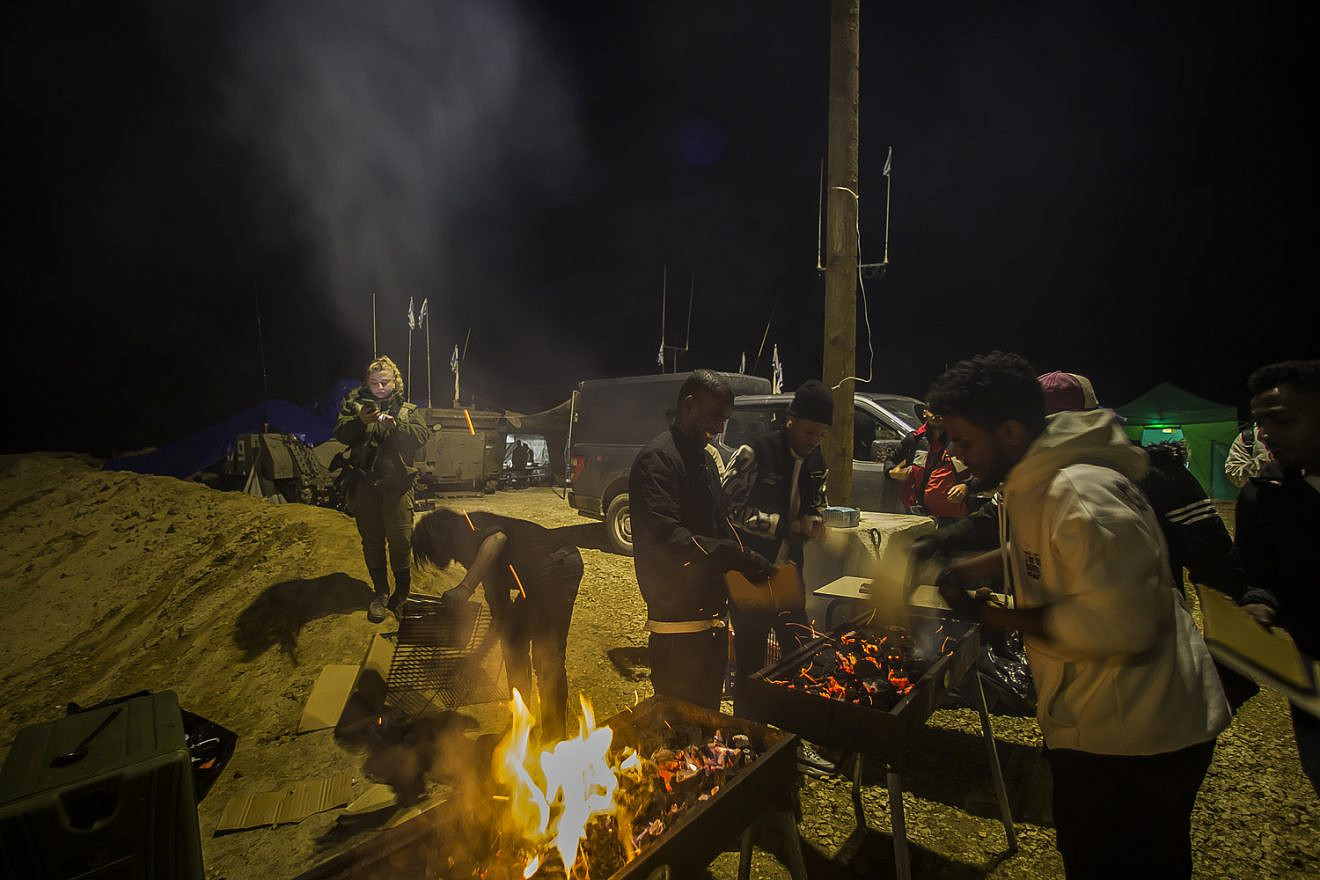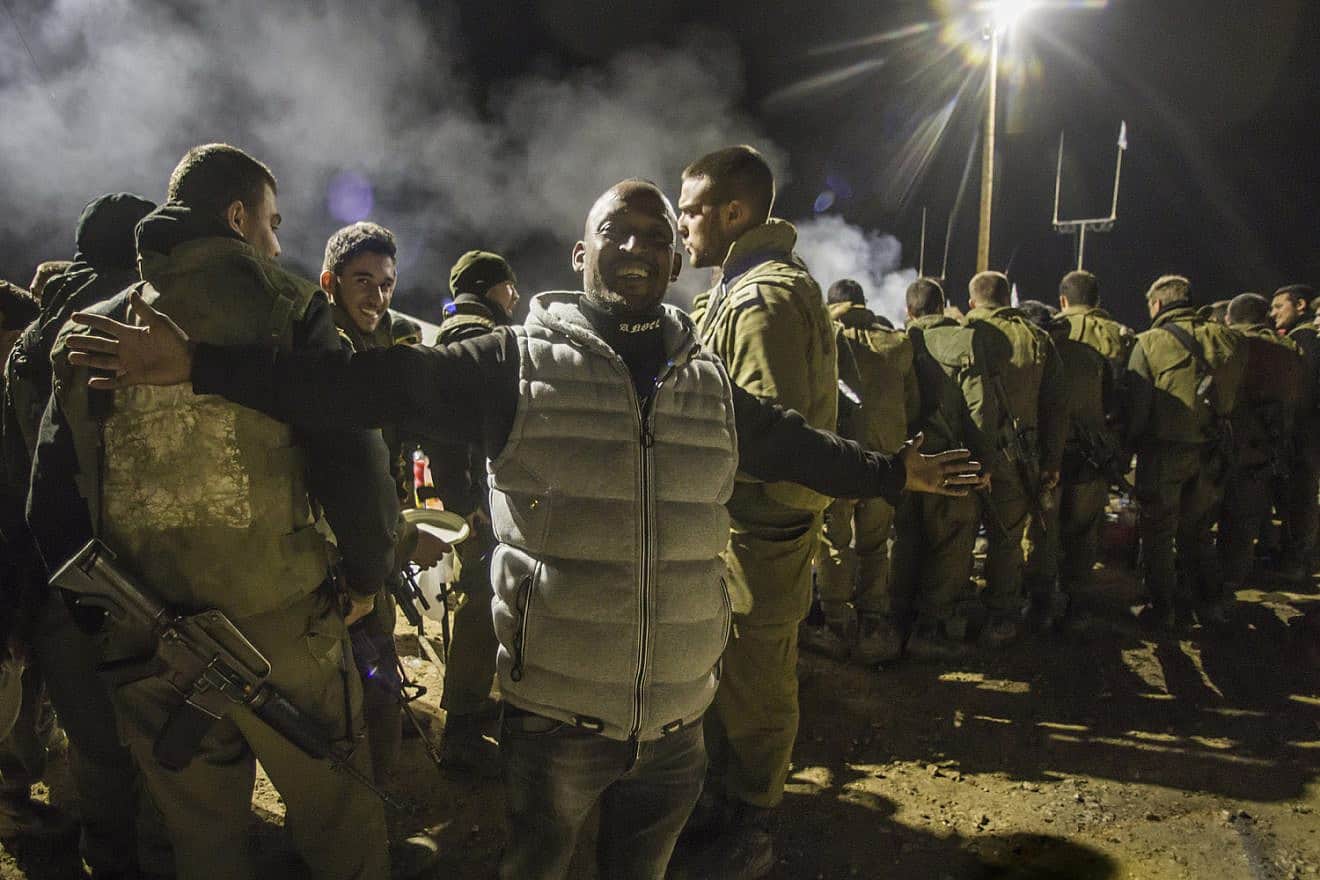Dozens of Eritrean migrants hosted IDF soldiers serving on the border with Gaza to a festive barbecue dinner on Tuesday, showing support for the country where they have sought shelter.
The extraordinary event saw the workers-cum-asylum seekers and an IDF artillery unit stationed on the outskirts of this southern kibbutz, which was hard-hit in the Hamas invasion, break bread together.
“We feel that this is our country, and what happened on October 7 happened to us as well,” said 36-year-old Yhselu Gebrem.
Gebrem, who has lived in Israel for 12 years, noted that this was the fourth time their group of Christian Orthodox Eritreans who oppose the totalitarian government that has ruled Eritrea for the last three decades, ever since their country’s independence from Ethiopia, had come to volunteer on the Gaza-border, including previously offering a helping hand to farmers.
“We came to support the people of Israel during their difficult hour and to be at your side,” said Michael Russoi, 30, who came to Israel 14 years ago and works in a supermarket in Ashdod. “We saw what happened on [Oct. 7] and there are simply no words to describe it. Your enemy is the enemy of us all.”

A full spread
As a thunderous explosion of artillery pierced the air, the volunteers, who had funded the 24,000 shekels ($6,350) kosher catered barbeque event for hundreds of soldiers, manned the tables set up under a star-studded sky, working the grill of steaks, hamburgers, hot dogs, chicken and kebab that along with salads galore would be soon devoured by a hungry army of soldiers, used to mostly packaged foods.
“It really is heartwarming to see all the civilians who are coming here to be with us, and I am enjoying every moment of it,” said reserve soldier Amir Alfedi, 23, from the town of Gan Yavne, near Ashdod. “It warms our hearts and our stomachs.”
Bashar, a Druze soldier, tersely said, “We have no other country,” and was then embraced by his fellow soldier.
More than half a dozen languages could be heard mixing in the crowd, including Hebrew, English, French, Russian, Arabic and Tigrinya.
“We came to say we are with you,” offered Teshema Kiflon, 33, who came to Israel from Eritrea 13 years ago and now lives in Tel Aviv.
Unity with the people’s army
The bonding on a chilly winter evening offered a stark contrast with the pre-Oct. 7 bitter polarization that rocked Israeli society last year over judicial reform, and the internecine turmoil within the Eritrean community between supporters and opponents of the Eritrean government that erupted into open violence in Tel Aviv in September.
For now, at least, the war has changed all that and the brotherhood that is near-omnipresent nationwide grew even wider at the event to include the Eritrean community.
A ‘tiny minority’ in a troubled region
About 17,000 Eritreans live in Israel.
Amid uncertainty over their future, most of the Eritreans in the country are viewed as economic migrants and get their visas renewed every six months, and are not recognized as refugees.
Migrants’ supporters say Israel, a country founded upon the ashes of the Holocaust and built up by Jewish refugees, should welcome those seeking asylum. Opponents claim the migrants have brought crime to the poor south Tel Aviv neighborhoods where many have settled.
The debate over their future was not in evidence Tuesday as the now Hebrew speakers blended in with the crowd.
“We are a tiny minority in the region which share the same destiny,” said Habtom Ghebrezghiabher, 42, who lives with his wife and three children in Jerusalem after coming to Israel over a decade and a half ago and has been granted refugee status. “We share the same culture based on shared Judeo-Christian values.”
“Israelis pride themselves on being reasonable, logical and liberal people,” said Tesfazion Berhe Gerhelase, an Eritrean opposition figure who has been living in exile in London for the last 25 years and who came to Israel for the event. “People don’t understand that there is no such thing here in this region.”


























